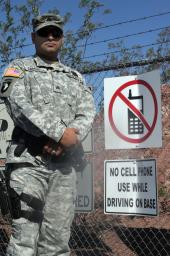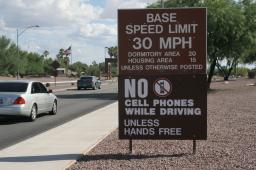- Slug: BC-CNS-Cell Phones-Bases,740
- Note: A Cronkite News Service Weekend Special
- With: BC-CNS-Cell Phones-Bases-Box
- Photos available (thumbnails, captions below)
By ELIZABETH SHELL
Cronkite News Service
If Kimberly Alford gets a call on one of her two cell phones while driving, she’ll either let it go to voice mail or pull over. She wishes others did the same.
“I do see a lot of people driving, using their cell phones, and you can see they’re not paying attention,” Alford said. “You may have to drive more defensively because of that.”
One place she doesn’t have to worry as much is Yuma Proving Ground, the U.S. Army test facility in southwestern Arizona where she works in human resources. Drivers caught using cell phones without hands-free devices can get citations.
That gives Alford some peace of mind.
“I say just pull over,” she said. “It might just save somebody’s life.”
While lawmakers, other public officials and interest groups consider whether Arizona should bar drivers from using cell phones or from text-messaging while driving, military bases around the state already have such bans, following a 2005 Department of Defense directive. And military officials say their streets are safer because of it.
“Any time we can reduce distractions it’s good for drivers,” said Chuck Wullenjohn, a public affairs officer at Yuma Proving Ground.
“We know it’s working because we see people pulled over to the side of the road,” said Tanja Linton, spokeswoman for Fort Huachuca, an Army base in Sierra Vista.
Concerned about drivers being distracted in school zones and around the many pedestrians on base, Fort Huachuca began more aggressive enforcement of the ban earlier this year, Linton said. That includes citations with the possibility of a $50 fine and a court appearance not only for military personnel but contractors and visitors.
“When you start hitting people in the wallet they start paying attention,” Linton said.
It didn’t take long for Davis-Monthan Air Force Base in Tucson to follow suit, and the impact is easy to see, officials there said.
“Vehicle accidents have gone down,” said Senior Master Sgt. Todd Fuller, security forces manager at the air base. “Safety was the No. 1 factor behind this.”
As is the case at Fort Huachuca, those receiving citations at Davis-Monthan for cell phone use also accumulate points that, along with other infractions, can cost them driving privileges for a week.
“We’ve seen a drastic reduction in cell phone use while driving _ having to walk through the installation for seven days seems to be a pretty good motivation,” said Master Sgt. Jeffrey Ward, operations superintendent at Davis-Monthan.
State Sen. Al Melvin, R-Tucson, a Marine Corps veteran, said the military directive is a smart idea and is an example for the rest of Arizona.
“It’s so sad how many people die every year,” he said of cell phone-related crashes.
Melvin introduced legislation in this year’s session to ban text-messaging while driving, but the full Senate voted it down. He plans to try again during the 2010 session and is optimistic the bill will pass.
Melvin said he’d prefer a law requiring hands-free devices for drivers using cell phones, similar to the military ban, but said the measure has a better chance of passing by focusing on text-messaging.
“I look at it as a safety issue,” he said. “It makes sense, and I feel confident that sanity will prevail.”
A recent study by Virginia Tech found that those who text while driving are 23 times more likely to be in crashes.
Nineteen states and the District of Columbia ban texting while driving, and six states plus the District of Columbia require drivers to use hands-free devices for cell phones, according to the Governors Highway Safety Association.
While drivers zipping along East McDowell Road in Phoenix have no such restrictions, those turning into the Arizona National Guard’s headquarters will get an earful from Army Staff Sgt. Jedrek Correa, who mans the gate, if they’re talking on cell phones. The Department of Defense policy applies there too.
Even though signs warn against cell phone use in large type, Correa said he has to ask 25 to 30 percent of drivers to hang up.
“I won’t let them in until they’re off the phone,” he said. “I tell them, ‘I’ll wait until you’re done.'”
At Luke Air Force Base in Glendale, using a hands-free device has become second nature for die-hard cell phone users, said Justin Oakes, chief of media.
“We move so frequently from installation to installation using them is almost an involuntary action,” Oakes said. “It’s just a habit. And we’ve had zero accidents so far this year.”
^___=
PHOTOS: Click thumbnails to see full-resolution images.

Army Sgt. Eddie Campbell, a security guard at the Arizona National Guard’s facility at Papago Park in Phoenix, stands next a sign warning those driving on base that cell phone use is prohibited. While lawmakers, other public officials and interest groups debate whether to ban cell phone use or texting while driving, military bases in the state already have such bans, following a directive from the Pentagon. (Cronkite News Service Photo by Elizabeth Shell)

A sign warns drivers entering Davis-Monthan Air Force Base in Tucson that driving cell phone use is prohibited. While lawmakers, other public officials and interest groups debate whether to ban cell phone use or texting while driving, military bases in the state already have such bans, following a directive from the Pentagon. (Cronkite News Service Photo by Elizabeth Shell)